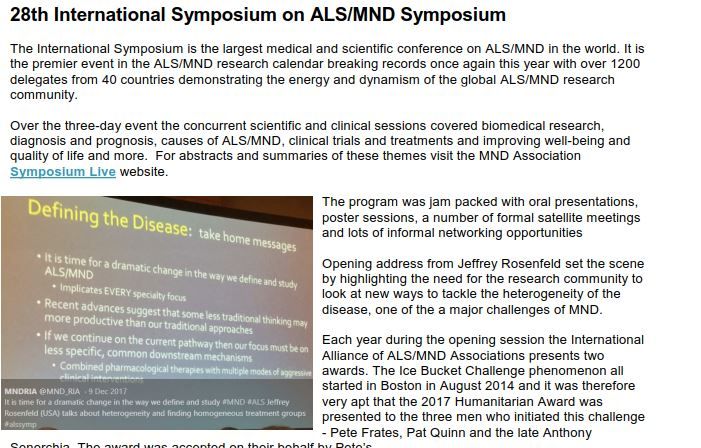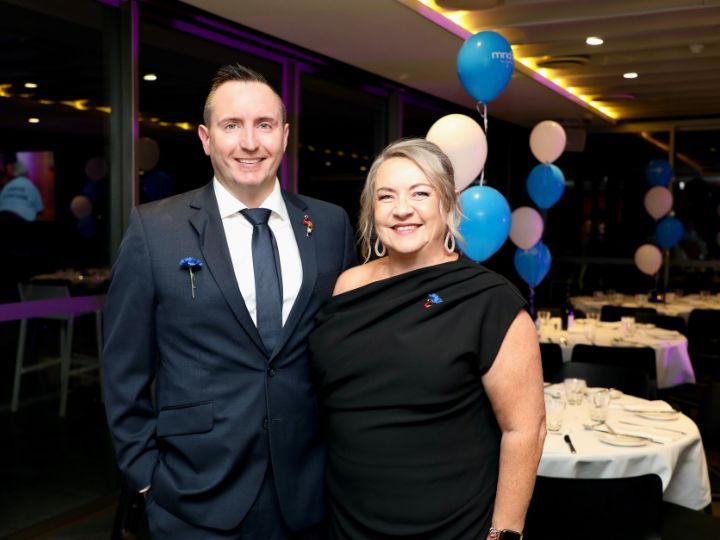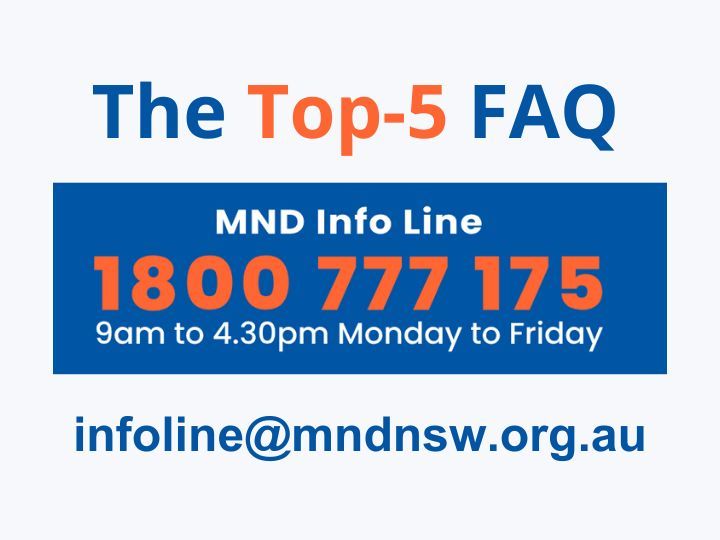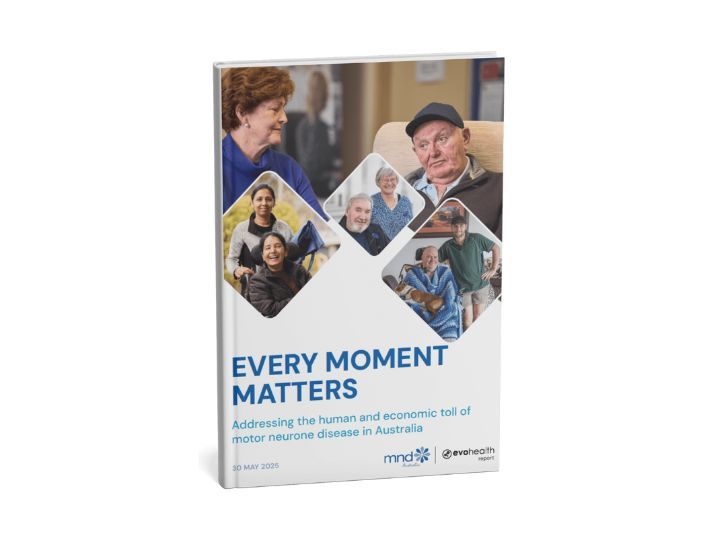The International Symposium is the largest medical and scientific conference on ALS/MND in the world. It is the premier event in the ALS/MND research calendar breaking records once again at the end of 2017 with over 1200 delegates from 40 countries demonstrating the energy and dynamism of the global ALS/MND research community. Here is an update on Symposium happenings and news from Carol Birks, CEO, MND Australia.
"Over the three-day event the concurrent scientific and clinical sessions
covered biomedical research, diagnosis and prognosis, causes of ALS/MND, clinical trials and treatments and improving well-being and quality of life and more. For abstracts and summaries of these themes visit the MND Association Symposium Live website.
The program was jam packed with oral presentations, poster sessions, a number of formal satellite meetings and lots of informal networking opportunities Opening address from Jeffrey Rosenfeld set the scene by highlighting the need for the research community to look at new ways to tackle the heterogeneity of the disease, one of the a major challenges of MND.
Each year during the opening session the International Alliance of ALS/MND Associations presents two awards. The Ice Bucket Challenge phenomenon all started in Boston in August 2014 and it was therefore very apt that the 2017 Humanitarian Award was presented to the three men who initiated this challenge - Pete Frates, Pat Quinn and the late Anthony Senerchia. The award was accepted on their behalf by Pete’s mother Nancy Frates. The Forbes Norris Award, first presented in 1994, honours the memory of Dr. Forbes “Ted” Norris, a neurologist dedicated to helping people with ALS/MND. Last year’s Forbes Norris recipient, Dr. Mamede de Carvalho presented the 2017 award to Boston based neurologist and researcher Merit Cudkowicz, The annual Paulo Gontijo Prize in Medicine was awarded to Dr Marka van Blitterswijk of the Mayo Clinic in Jacksonville, Florida. The Award is presented to an outstanding young investigator working on ALS/MND. Read about her work here.
Research highlights from the Symposium included the discovery of two new genes linked to MND and the use of antisense oligonucleotide-based therapies, which is looking hopeful for people with SOD1 and C9orf72 mutations.
Presentations on expanded/pre-approval access to potential therapies stimulated discussion. As always the inimitable Richard Bedlack entertained whilst challenging us all to reflect on our views and practice.
The multi-step process of MND progression and factors such as genetic mutations that may shorten this process was a feature of a number of presentations. You can listen to Professor Al–Chalabi’s talk at previous conference on this theory here.
Clinical highlights included presentations on carers and cognitive change, telemedicine, app development and much more. The MND Association research blog ‘There’s an app for that – the wonders of technology in ALS’ provides an overview of some of these presentations.
There were a number of sessions that covered Clinical Trials highlighting the worldwide research focus on the search for an effective treatment but also the complexities associated with this search. For an overview of the Clinical trials session take a look at the MND Association blog. We were all disappointed to learn that the phase three trial of tirasemtiv was negative but will watch with interest the current investigation by the European Medicine Agency (EMA) on Masitinib which has shown a slowing of progression in a phase 2/3 trial. Further confirmatory clinical trials will be conducted to provide more necessary information (including higher dosage effects) to the EMA.
For further highlights check out more MND Association research blogs:
-
Causes, treatment therapies, biomarkers and clinical trials – Mary-Louise Rogers (Adelaide) findings on her study looking at a protein called p75, which is shed from injured nerve cells and traces of it can then be found in urine, as a potential biomarker is featured.
-
Clinical Management - covers presentations on recent advances in respiratory support, technology, neck support and more.
-
Not just about the neurones – the role of glial cells formed the theme for Session 9A on the last day of the meeting. There are several types of glial cells found in the CNS, but researchers have largely focused their attention on two particular members of the glial cell family: astrocytes and microglia. Australian researcher Marco Morsch (Sydney) findings on his study that shows microglia can help to mop up proteins such as TDP-43 when they leach out of sick or injured cells is featured.
Once again, the Australian contingent of researchers made their mark. The MND Research Institute of Australia (MNDRIA) is proud to have funded nine of the Symposium presenters including Beryl Bayley MND Research Fellow, Dr Parvathi Menon from University of Sydney. Parvathi reported that cortical hyperexcitabilty is a regional phenomenon in MND, most prominent in cortical areas representing the hand region. Dr Marco Morsch from Macquarie University presented some elegant research using zebrafish to visualise microglial activation in real time highlighting the ability of microglial cells to uptake TDP-43 and showing if this does not happen there is abnormal dispersal of TDP-43 into neighbouring tissue. Dr Frederik Steyn of The University of Queensland - UQ discussed the association of hypermetabolism with lower motor neurone burden and functional decline. Dr Nimeshan Geevasinga from University of Sydney studied 305 people with MND and found cortical excitability scores may be a useful novel biomarker for diagnosing MND.
The Aussies were also out in force for the poster session.
Congratulations to Dr Mehdi Van Den Bos from University of Sydney, who stood out in a field of 450 to be awarded a prize for his poster 'Imbalance in cortical inhibition-excitation networks underlies the development of cortical hyperexcitability in ALS'.
We were all enormously proud of the strong Australian presence at the Symposium and the big part MNDRIA has played in making this happen.
Check out some of the posters and slides uploaded by presenters to the MND Association 28th International Symposium website and also @mndaustralia @MND_RIA #alssymp on twitter, for further insights and highlights.
Satellite Meeting
The Pan Asia Consortia for the Treatment of ALS/MND (PACTALS) met to provide an update on the PACTALS meeting in Japan in September 2017 and to discuss next steps. I provided an overview on behalf of the International Alliance of ALS/MND Associations on Outreach and Partnering in the Asia Pacific Region, the Alliance Support Grant Program and the 2017 Asia-Pacific ALS/MND Conference & China ALS/MND Patient Conference, Beijing.
Professor Kim from South Korea invited delegates to the next meeting to be held in Seoul in July.
This year’s Project MinE meeting was again very well attended and provided updates on progress and results to date. More countries are now on board, more samples have been analysed and more new genes have been discovered.
A new initiative spearheaded by ALS TDI introduced funding to support people living with ALS/MND to attend the Symposium. Six Patient Fellows were awarded and this blog written by some of the Fellows provides further insights on the presentations from the perspective of a person living with MND and caregivers. One of the Fellows commented “One of the purposes of the ALS/MND Patient Fellows program was to make sure the patient perspective was not lost in the scientific proceedings. Overall, I was deeply impressed by how connected most of the discussions were to the patient experience. In hindsight, I think there were two areas where the patient voice could have been stronger: invasive ventilation and ineffective placebo arms in trials”.
This year the ‘patient’ voice was louder and stronger with many presenters acknowledging people living with ALS/MND as integral to their research outcomes and the inspiration for their work.
The highlight of the closing session was therefore the presentation of the inaugural Shay Rishoni Patient Impact award to Bernard Muller and Robbert Jan Stuit founders of Project MinE and Treeway. Two people living with ALS/MND who have made a huge impact on research globally.
The meeting wrapped up with an invitation from MND Scotland to attend the International ALS/MND Meetings in Glasgow from 4 to 9 December 2018.
During 2018 we will be working with the MND Association Conference team, the International Alliance of ALS/MND Associations and MND WA to finalise details for the 30th International Symposium on ALS/MND to be held in Perth from 1 to 6 December 2019. Mark your diaries now - let’s make Perth 2019 a record!"
Carol Birks, CEO, MND Australia




